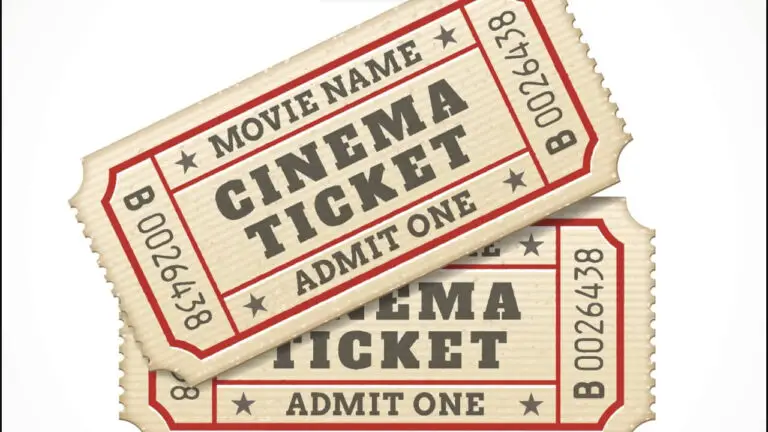
Going to the movies can be one of life’s great escapes. As the lights dim, the screen ignites our imagination, transporting us into new worlds of wonder, excitement, laughs, or tears. However, before those lights go down, many moviegoers face a modern frustration – the convenience fee.
You select your perfect seats, add some popcorn and drinks to your order, go to pay for your movie night indulgence…and then it happens. An extra $2 convenience fee gets tacked on to your ticket total, hijacking a bit of joy from your anticipated evening.
A convenience fee is an additional charge that gets added when you purchase movie tickets online or through a theater chain’s mobile app instead of at the physical box office. Usually small – around $1-2 per ticket – but annoying nonetheless.
In this guide, we’ll explore what exactly convenience fees are, why theaters charge them, just how convenient they really are for customers, and tips for avoiding them when possible. With the facts in hand, these pesky fees won’t put as big a dent in your movie night budgets or bliss. Ready for the show? Lights, camera, action!
What is a Convenience Fee Exactly?
A convenience fee, sometimes also called a service charge or surcharge, refers to an extra fee tacked on to the final amount of transactions like buying concert, sports, movie tickets, or paying bills online. It covers the cost of providing the alternative online purchasing option.
For movie tickets specifically, convenience fees apply whenever tickets get bought through a theater chain’s website, mobile app, or an affiliated third-party ticketing company instead of at the physical ticket counter.
These additional fees allow theaters to keep their base ticket prices more affordable while still offsetting the expenses involved with maintaining online ticketing systems. It’s a way for theaters to earn extra income from the convenience they offer customers instead of having to bake those costs into all tickets universally.
So next time that frustrating $2 inconvenient fee rears its head at checkout, remember it exists to sustain the digital infrastructure that enables that super convenient, line-skipping, perfect-seat-picking experience in the first place. A bit of necessary evil for an otherwise sweet deal.
Key Facts About Convenience Fees
To understand convenience fees in more detail, here are some of their key characteristics:
- Amount: Typically small fixed charges around $1-2 per ticket purchased online/via an app, but sometimes up to 1-3.5% of a ticket’s full price
- Legality: Permitted in all 50 U.S. states when disclosed during the purchasing process
- Purpose: Helps cover theater costs like payment processing fees, IT expenses, and technology investments
- Application: Added to all tickets bought through alternative purchase channels like websites and mobile apps instead of at theater box offices
- Transparency: Theaters must clearly notify customers about convenience fees during the checkout process
So in short – they generally don’t cost an arm and a leg, follow laws, offset real theater operational expenses, apply exclusively to online/app orders, and can’t be sneakily withheld from your total. Good to know before grimacing at the sight of them!
Now let’s unravel exactly why theaters rely on these fees in the internet and mobile app age.
Why Do Movie Theaters Charge Convenience Fees?
Movie theaters charge convenience fees to generate extra revenue that helps cover the genuine costs required to operate online and mobile ticketing channels conveniently used by millions of customers.
Sure, tickets could be cheaper across the board if not for these fees. But then theaters would have to cut investments in other areas like picture and sound quality, seating amenities, or staff wages to fund tech instead. By keeping base ticket prices more affordable for all while applying fees to those opting for added convenience, they create a balanced model.
What Theater Costs Do Convenience Fees Help Offset?
So what exactly justifies making convenience-seekers foot some of the bill? Here are some examples of the real-world costs theaters must pay to provide digital ticketing solutions and the conveniences users enjoy as a result:
Payment Processing Fees
Whenever someone buys a movie ticket online or via an app, theaters get charged payment processing fees by companies that handle secure credit/debit card transactions. These generally range from 2-3.5% of the total purchase amount. Convenience fees help defray those.
Website and App Development/Maintenance
Whether a theater chain builds their own ticketing platform in-house or pays a vendor, there are considerable technology costs involved with creating and maintaining a reliable, secure e-commerce site and accompanying mobile app. Continuous improvements and features come at a price too.
IT Infrastructure Investments
Behind any digital product lies complex IT infrastructure like servers, networks, and databases that make it functionally possible. That equipment and its continuous modernization to scale growing demand isn’t free.
Offset Losses from Discounted Tickets
Theaters also offer many discounted ticket types, from matinees and student tickets to senior fares and group rates. Those make tickets affordable for price-sensitive groups but also shrink theaters’ profit margins. Applying convenience fees exclusively to online/app full-price purchases allows them to cushion those losses a bit.
As you can see, convenience demands heavy technology investments on theaters’ parts. So while no one likes paying more, the fees do serve valid business purposes.
The Value Provided to Customers
However, let’s also highlight what customers gain from these IT investments funded by convenience fees:
Advanced Ticket Purchasing
Online and mobile ticketing allow customers to buy tickets earlier at their convenience instead of trekking to the theater ahead of time. No more worrying about showtimes selling out.
Seat Selection
Customers can pick their perfect viewing seats in advance rather than settling for leftovers at showtime. About two-thirds of theaters now offer assigned seating.
Shorter Lines
Online tickets mean fewer people queued up physically to buy in person. Mobile tickets also allow entering theaters faster by skipping the ticket counter.
Flexibility and Control
Digital channels allow buying tickets anywhere, anytime – at home, work, or on the go. Customers gain flexibility and control.
So in exchange for minor convenience fees, customers enjoy significant perks like ensured tickets, better seats, less waiting, and enhanced flexibility. That convenience comes at costs shouldered partly by fees.
Now with the why explained from both sides, let’s see how lightening the sting of convenience fees is possible.
Ways to Avoid Convenience Fees on Movie Tickets
While dodging convenience fees entirely may not be realistic, some smart strategies can help you minimize or eliminate them:
1. Buy Tickets at Theater Box Office
The most guaranteed way to avoid convenience fees is to purchase movie tickets at the theater’s physical box office instead of online or with the mobile app. Since those alternative channels trigger the fees, skipping them means no fees added.
But of course, buying tickets in-person means no advanced seat assignments, mobile tickets, or at-home convenience. You’ll have to go to the theater ahead of time and risk long ticket lines depending on showtime demand. Still, if skipping fees trumps all else, this remains the surefire way.
2. Utilize Theater Membership Programs
Many theater chains like AMC or Regal Cinemas offer free membership programs that provide loyalty perks. And one common perk is waiving online/app convenience fees for members!
For example, AMC Stubs Premiere members don’t pay convenience fees as a membership benefit. Regal Crown Club members similarly enjoy a $0.50 discount on these fees when buying through Regal’s app.
So enroll in your preferred theater’s free rewards program to see if it grants fee waivers or discounts that offset the minor membership cost. Just one or two ticket orders can lead to savings!
3. Check Third-Party Seller Discounts
Customers sometimes assume convenience fees only come from theaters themselves. But often third-party ticketing sites like Fandango also tack on their own fees.
While buying directly through a theater’s website or app means only paying their convenience fee, third-party sellers effectively double-dip – charging you their own fee on top of the theater’s!
However, third-party ticketing sites also run frequent promotions with discount codes that occasionally waive convenience fees. So if you must purchase through them, hunt for one of those limited-time fee-free codes.
Just know their core business thrives on charging convenience fees, so fee-waived promos only provide temporary relief before getting rescinded.
4. Buy Discount Tickets
Convenience fees stay consistent no matter what type of movie ticket you select. But with discounted matinee, senior, or student priced tickets, the fee becomes a larger percentage of that cheaper base cost.
For example, paying a $2 fee hurts more when your ticket itself only costs $6 versus $15. So choosing lower-priced ticket types helps offset the proportional sting of the attached convenience fee.
5. Appeal to Customer Service
Technically theaters can charge fees at their sole discretion, with no obligation for exceptions. However, it can’t hurt to make your case directly to customer service reps by phone or chat if you face extenuating circumstances.
Maybe you’re buying a large group order and don’t want to pay fees multiplying extensively. Or a medical issue makes in-person purchasing extra challenging. Whatever your unique situation, politely appeal to a human representative. With some sympathy and luck, one-time fee waivers occasionally get granted on a case-by-case basis.
While dodging convenience fees entirely may stay unrealistic given their valid business purposes, following those handy tips should help minimize their hit to your movie night budgets and bliss as much as possible!
Frequently Asked Questions About Convenience Fees
Still feeling puzzled by convenience fees? Here we answer some other common questions moviegoers have:
Are convenience fees legal? Can I refuse to pay them?
Yes, convenience fees are legal in all 50 U.S. states, so long as theaters disclose them upfront during the checkout process. Because they legally qualify more as “convenience charges” versus prohibited “surcharges on credit card use alone”, refusing payment over them breaks theater terms and conditions.
Why do only some theaters charge convenience fees?
Whether or not conveniences fees get charged depends on each theater’s business model. Some smaller chains and independently-owned theaters opt not to. Large chains like AMC, Regal, etc overwhelmed by high web traffic and app usage are more likely to charge fees to fund supporting tech investments.
How much are most convenience fees? A fixed amount or percentage?
Convenience fees typically range from $1-2 per ticket purchased online/via apps. Sometimes up to 1-3.5% of a ticket’s full price, but fixed small dollar amounts are more common. Specific fee amounts depend on the theater.
Can movie theaters legally charge different convenience fees?
Yes. There is no mandated federal or state cap dictating how much (or little) theaters can charge in convenience fees. So while $2 per ticket is average, some theaters charge less while others go up to $5 when demand permits. No universal rule restricts differential pricing.
Where exactly do my convenience fees go? In theater pockets or processing companies?
The conveniences fees you pay go entirely to the theater company itself, NOT third-party processing firms. The fees help theaters offset the separate processing and technology costs involved with maintaining online/app ticketing solutions. No kickbacks take place.
What other industries commonly charge convenience fees too?
Besides entertainment venues like movie theaters, convenience fees also often appear for online payments to hotels, concerts, theme parks, public transport, colleges, government services, and more. Any organization providing alternative purchasing channels passes some costs to users this way.
We hope those answers help settle the convenience fee confusion! Ready to digest it all and put those tips for avoiding fees to work on your next movie outing?
Key Takeaways: Your Convenience Fee Cheat Sheet
Let’s recap the key facts for comprehending convenience fees on movie tickets:
- What are they? Additional charges added when buying tickets online/via apps instead of the box office to cover operational expenses
- Typical fee? Around $1-2 per ticket
- Why charged? Helps fund technology investments enabling convenient digital ticketing
- Legal? Permitted in all states when disclosed during checkout
- Avoid with: Buying in-person, theater rewards programs, discounted tickets, appealing to customer service
So in summary – convenience fees unpleasantly tack on a bit more for your movie night indulgences when opting for quick online tickets or perfect seat selections through theater apps. But they serve as necessary revenue helping theaters offer those useful conveniences we’ve come to expect. And with some savvy strategies, minimizing their hit is possible to maintain more movie magic per dollar spent!






